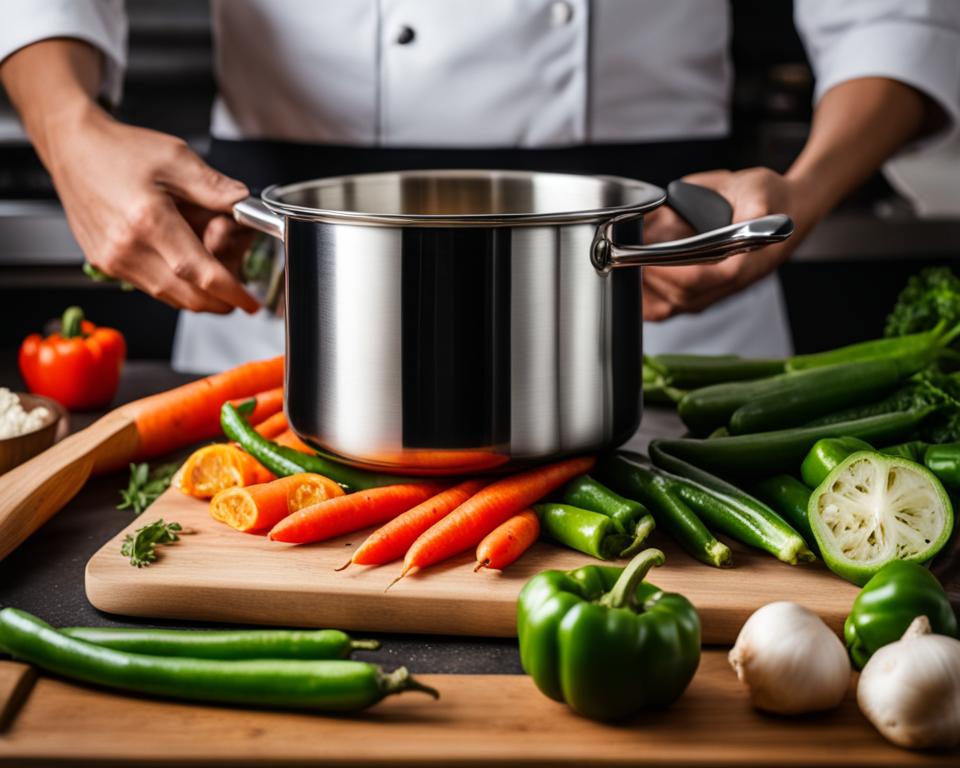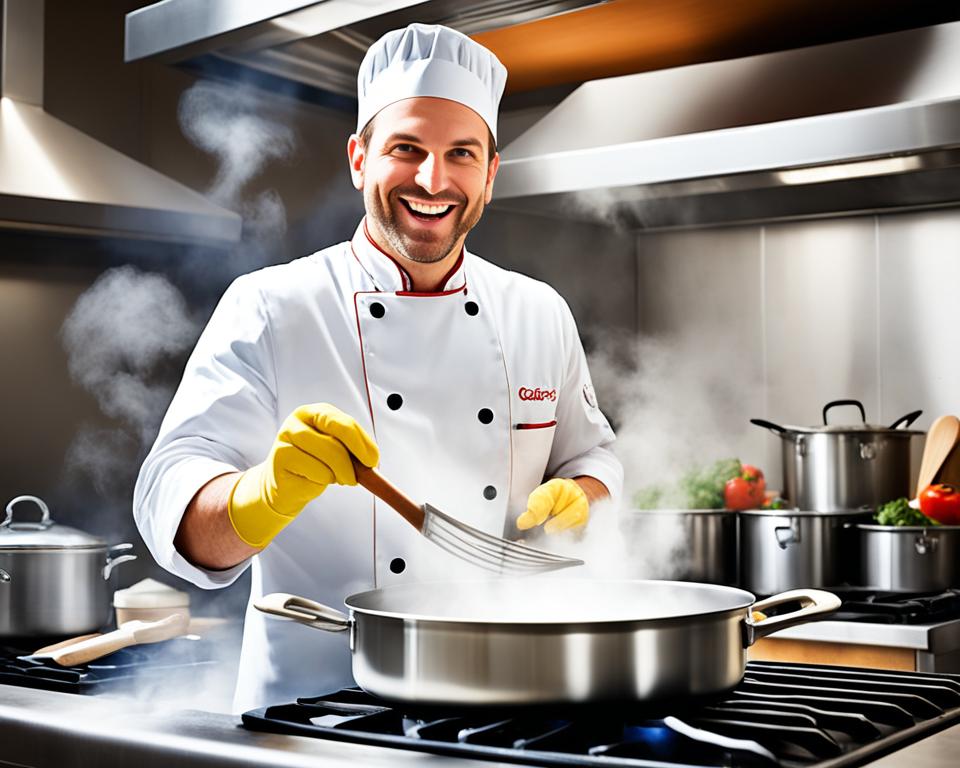Introduction
Stainless steel cookware is a popular choice for home cooks because it is durable, versatile, and easy to clean. Stainless steel is a type of steel that is alloyed with chromium, which gives it its corrosion-resistant properties. Stainless steel cookware is also typically non-stick, making it easy to cook food without using a lot of oil or butter.
In this article, we will discuss the benefits of stainless steel cookware, the different types of stainless steel cookware available, how to choose the right stainless steel cookware set for your needs, and how to care for your stainless steel cookware. We will also address some common problems with stainless steel cookware and how to troubleshoot them.
By the end of this article, you will have a better understanding of stainless steel cookware and be able to make an informed decision about whether or not it is the right choice for you.
Benefits of stainless steel cookware
Stainless steel cookware is a popular choice for many home cooks because it is durable, versatile, and easy to clean. Here are some of the benefits of using stainless steel cookware:
- Stainless steel is a very durable material that can withstand high heat and repeated use.
- Stainless steel is non-stick, so food does not stick to the surface of the pan.
- Stainless steel is easy to clean, and can be cleaned with soap and water or in the dishwasher.
- Stainless steel is a versatile material that can be used for a variety of cooking methods, including searing, frying, boiling, and baking.
Types of stainless steel cookware
There are many different types of stainless steel cookware available on the market, each with its own unique set of features and benefits. Some of the most common types of stainless steel cookware include:
- Stainless steel stockpots and saucepans
- Stainless steel skillets
- Stainless steel frying pans
- Stainless steel Dutch ovens
- Stainless steel woks
Each type of stainless steel cookware is designed for a specific purpose, so it is important to choose the right type of cookware for the task at hand. For example, stainless steel stockpots and saucepans are ideal for boiling, simmering, and braising, while stainless steel skillets are perfect for searing, frying, and sautéing.
When choosing stainless steel cookware, it is also important to consider the thickness of the cookware. Thinner cookware will heat up more quickly, but it is also more likely to warp or burn. Thicker cookware will take longer to heat up, but it will also distribute heat more evenly and prevent food from sticking.
IV. How to choose the right stainless steel cookware set
When choosing a stainless steel cookware set, there are a few factors to consider.
- The number of pieces in the set
- The size of the pieces
- The material of the handles
- The construction of the cookware
- The warranty
The number of pieces in the set will depend on your needs. If you only cook for yourself or a small family, you may only need a basic set of pots and pans. However, if you cook for a large family or entertain often, you may want a larger set that includes more pots, pans, and utensils.
The size of the pieces will also depend on your needs. If you have a small kitchen, you may want to choose smaller pots and pans that will take up less space. However, if you have a large kitchen, you may have more room for larger pots and pans.
The material of the handles is important because it will affect how the cookware heats up. Stainless steel handles are a good option because they are heat resistant and will not get hot to the touch. However, some people prefer to use cookware with wooden or silicone handles, which are more comfortable to grip.
The construction of the cookware is also important. You want to choose cookware that is made from high-quality materials and that is well-constructed. Look for cookware that is made from thick, heavy-gauge stainless steel. The cookware should also have a tight-fitting lid to prevent food from boiling over.
Finally, you should consider the warranty when choosing a stainless steel cookware set. A good warranty will protect you in case the cookware is defective or breaks.
How to care for stainless steel cookware
Stainless steel cookware is a popular choice for many home cooks because it is durable, versatile, and easy to clean. However, it is important to care for stainless steel cookware properly in order to extend its lifespan and maintain its performance.
Here are some tips for caring for stainless steel cookware:
- Wash stainless steel cookware with warm, soapy water and a soft cloth or sponge. Avoid using harsh abrasives or cleaners, as these can damage the finish.
- Do not use metal utensils on stainless steel cookware, as these can scratch the surface. Use only wooden or plastic utensils.
- Do not dry stainless steel cookware on a hot burner, as this can warp the cookware. Allow it to air dry or dry it with a soft towel.
- If stainless steel cookware becomes stained, you can remove the stains by using a mild acid, such as vinegar or lemon juice. Soak the cookware in the acid for a few minutes, then rinse it thoroughly with warm water.
By following these tips, you can keep your stainless steel cookware looking its best and ensure that it lasts for many years to come.
VI. Common problems with stainless steel cookware
Stainless steel cookware is generally very durable, but there are a few common problems that can occur.
-
Stainless steel can become discolored or stained if it is not properly cared for.
-
Stainless steel can rust if it is not properly dried after washing.
-
Stainless steel can become scratched if it is not used with care.
Here are some tips for avoiding these problems:
-
Wash stainless steel cookware with warm, soapy water and a soft cloth.
-
Dry stainless steel cookware thoroughly after washing.
-
Do not use abrasive cleaners or scouring pads on stainless steel cookware.
If stainless steel cookware does become discolored or stained, it can be cleaned with a mild acid, such as vinegar or lemon juice. If stainless steel cookware does rust, it can be cleaned with a commercial rust remover or a paste made of baking soda and water. If stainless steel cookware becomes scratched, it can be polished with a commercial stainless steel polish or a paste made of toothpaste and baking soda.
VII. How to troubleshoot problems with stainless steel cookware
If you are experiencing problems with your stainless steel cookware, there are a few things you can check to troubleshoot the issue.
First, make sure that you are using the correct type of cookware for the task at hand. Stainless steel cookware is not suitable for all cooking methods. For example, you should not use stainless steel cookware on an induction cooktop.
Second, make sure that you are using the correct cooking oil or fat. Stainless steel cookware is not non-stick, so you need to use a cooking oil or fat that will prevent food from sticking.
Third, make sure that you are not overcooking your food. Stainless steel cookware conducts heat very well, so it is easy to overcook food.
If you have tried these steps and you are still experiencing problems with your stainless steel cookware, you may need to contact the manufacturer for assistance.
FAQs about stainless steel cookware
VIII. FAQs about stainless steel cookware
Here are some frequently asked questions about stainless steel cookware and their answers:
* **What is the difference between stainless steel and non-stick cookware?**
Stainless steel and non-stick cookware are two different types of cookware that have different properties and uses. Stainless steel is a type of metal that is resistant to corrosion and rust, while non-stick cookware is coated with a material that prevents food from sticking to it. Stainless steel cookware is more durable than non-stick cookware, but it is also more difficult to clean. Non-stick cookware is easier to clean, but it is more likely to scratch and the coating can wear off over time.
* **Is stainless steel cookware safe?**
Yes, stainless steel cookware is safe to use. Stainless steel is a non-toxic metal that does not release any harmful chemicals when heated. However, it is important to note that some stainless steel cookware may contain small amounts of nickel, which can be an allergens for some people. If you are allergic to nickel, you should choose stainless steel cookware that is nickel-free.
* **What are the benefits of using stainless steel cookware?**
There are many benefits to using stainless steel cookware, including:
- Stainless steel is a durable material that is resistant to corrosion and rust.
- Stainless steel cookware heats evenly and retains heat well.
- Stainless steel is a versatile material that can be used for a variety of cooking methods.
- Stainless steel cookware is easy to clean and maintain.
* **What are the disadvantages of using stainless steel cookware?**
There are a few disadvantages to using stainless steel cookware, including:
- Stainless steel cookware can be more expensive than other types of cookware.
- Stainless steel cookware can be more difficult to clean than non-stick cookware.
- Stainless steel cookware can discolor or stain if it is not properly cared for.
* **How do I care for stainless steel cookware?**
To care for stainless steel cookware, you should:
- Wash stainless steel cookware with warm, soapy water and a soft cloth.
- Avoid using abrasive cleaners or scouring pads on stainless steel cookware.
- Do not use metal utensils on stainless steel cookware.
- Dry stainless steel cookware thoroughly after washing.
* **How do I prevent stainless steel cookware from rusting?**
To prevent stainless steel cookware from rusting, you should:
- Dry stainless steel cookware thoroughly after washing.
- Store stainless steel cookware in a dry place.
- Avoid exposing stainless steel cookware to moisture or water for long periods of time.
* **What are some common problems with stainless steel cookware?**
Some common problems with stainless steel cookware include:
- Stainless steel cookware can discolor or stain if it is not properly cared for.
- Stainless steel cookware can rust if it is not properly dried after washing.
- Stainless steel cookware can be difficult to clean if it is not properly cared for.
* **How do I troubleshoot problems with stainless steel cookware?**
If you are having problems with your stainless steel cookware, you can try the following troubleshooting tips:
- Wash stainless steel cookware with warm, soapy water and a soft cloth.
- Avoid using abrasive cleaners or scouring pads on stainless steel cookware.
- Do not use metal utensils on stainless steel cookware.
- Dry stainless steel cookware thoroughly after washing.
Conclusion
Stainless steel cookware is a versatile and durable option for any kitchen. It is easy to clean and maintain, and it can be used for a variety of cooking methods. When choosing a stainless steel cookware set, be sure to consider the size, features, and budget. With so many great options available, you are sure to find the perfect set of stainless steel cookware for your needs.


